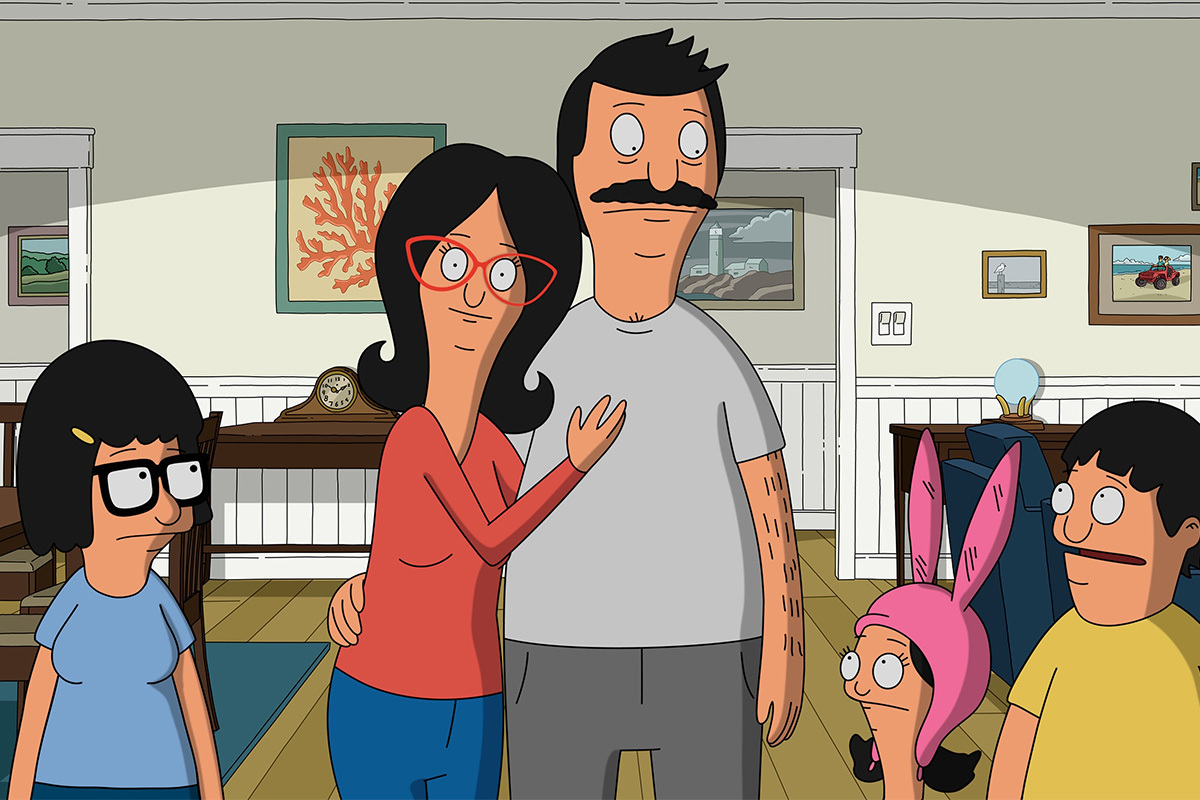For Purim this year, I dressed up as Bob Belcher, the titular character of the Fox show “Bob’s Burgers,” which, for the first time, is coming out as a movie on May 27th, 2022. For my costume, I went all in — I wore the white shirt and apron, the (stick-on) mustache, and even painstakingly replicated Bob’s bald patch and comb over from a cheap wig I bought on Amazon. Though I only started watching the show at the beginning of the pandemic, I immediately fell in love with the cartoon family — especially Bob, the patriarch of the bunch. Something about him felt endearingly familiar. The more I’ve watched the show, the more I’ve realized that although the Belchers aren’t portrayed as a Jewish family, they feel Jewish — and Bob feels arguably the most Jewish of all. One reason might be that he’s voiced by H. Jon Benjamin, a Jewish actor. But even more so, I think it’s because he embodies the qualities I associate with a mensch, which is compellingly wholesome to see on TV.
While Bob himself might not be a Jewish character, Benjamin’s own Jewishness shines through the character in his voice acting. (Benjamin has even admitted that he’s like Bob — though with a way better income.) He doesn’t use a stereotypical accent or spout Yiddish phrases (neither of which are in Bob’s portrayal), but Benjamin brings a sardonic, wry, self-deprecating personality to the character, that kind of humorous near-nihilism that is at the heart of many a Jewish soul. And the character further drives home this quintessential Jewishness through his actions. Bob Belcher is a family man who isn’t aggressive and rarely ever raises his voice when he’s angry — the ideal Nice Jewish Boy, a form of male identity that exists outside of toxic masculinity. He doesn’t demand respect, nor does he ever leverage his power physically (even in situations of provocation).
He’s also pretty openly insecure about himself in general, but in a way that ironically makes him more secure about his masculinity: For example, in Season 4, his lovingly-prepared Thanksgiving turkey is repeatedly found mysteriously in the toilet, so he keeps going to buy replacement turkeys. This leads the man at the meat counter to think it’s all an excuse for Bob to talk to him. Despite the deli man eventually telling Bob he’ll settle for him and go on a date, Bob doesn’t respond with the kind of enraged or alarmed homophobic reaction men with fragile egos do. Instead, he says (in typical Bob blustering fashion), “Sorry, I gotta go cook this. Also, I’m married. But if I wasn’t — who am I kidding, you’re out of my league. It would never work.” Macho: 0, Mensch: 1. This is how a mensch responds to this kind of situation, and it makes me kvell.
Mainstream society often equates a good husband and father with being a good breadwinner. However, Jewish culture is more focused on living a life according to wholesome values. So though it’s a consistent trope that Bob struggles to earn a living for his family, this never compromises the fact that he’s such a great dad. He supports his family without any grandiosity in almost every episode: He is a constant support for his oldest daughter, Tina (voiced by Dan Mintz) as she navigates puberty and middle school, like when he gets his legs waxed first to help her feel less afraid, in the episode when she suddenly feels self-conscious about body hair. (Then when Tina later regrets having waxed off her leg hair, he assures her “So you gave into peer pressure — it happens to everyone…leg hair or no leg hair, you’re still Tina. When it comes to the important stuff, you’ll make the right choice.”) He never attempts to project his masculinity onto his only son, Gene (Eugene Mirman), who displays a tendency for flamboyant gender fluidity. He even fills in for his wife Linda when she can’t make it for her and Gene’s weekly “Spaturday” tradition, fumbling through trying to put on a facial sheet mask, which his mustache makes difficult. And he spends a whole week assisting Louise, his youngest (Kristin Schaal), when she’s deeply anxious about her overnight school trip because she’s constipated the week prior and deeply fears pooping in a public bathroom. As a husband, he’s never tried to dominate his wife, the kooky and vivacious Linda Belcher (John Roberts), even when he doesn’t agree with her latest truly whacky scheme. He doesn’t expect her to fulfill stereotypical “wifely” duties, but he’s also not a pushover — he’s just a Nice Jewish Boy. Macho: 0, Mensch: 2.
Finally, I think Bob gets infinite mensch points for the Jewish values he espouses just by the default way he lives his life. He is focused on family and shalom bayit (supporting a peaceful home), even if it means helping his wife when she accidentally gets a raccoon she’s named Little King Trashmouth stuck under his bed. He fulfills the mitzvah of bikkur cholim (visiting the sick) when he brings his archnemesis, Jimmy Pesto, the hernia medication he needs — even though Jimmy is consistently terrible to him throughout the series — because there’s no one else to do it. (It’s still a mitzvah, even if Bob does end up returning just to play with Jimmy’s racetrack while Jimmy is knocked out on meds.) He prioritizes honesty, such as when he owns up to his own mistake in a four-car fender bender outside his restaurant, even though he could easily have let the clown in the front car take the blame and thus avoid inflated insurance fees. These are just a few of many, many examples.
The patriarch of the Belcher family is not canonically Jewish, but the Jewish man who plays him lends Bob his Jewish spirit, and the character has shown me the diversity of Jewish role models possible, outside the typical rabbi or Jewish camp counselor (fictional or not). At any rate, Bob Belcher and his family are honorary Jews in my book, and watching their many misadventures brings my lil’ Jewish soul joy. I’m excited to see what madcap mishaps they get into in the movie, and to see how else Bob sets an example for authentically living like a mensch.



